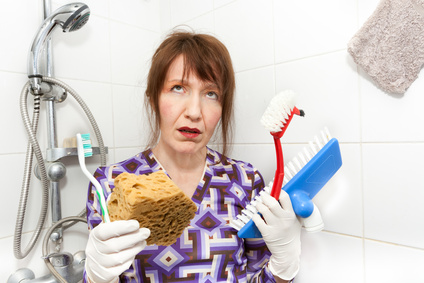Cleaning fairies: Magical ladies who come and whisk away the dust bunnies from under the couch and wipe the mystery sticky smudges from the fridge door.
The first time I heard the term, a friend was surveying the damage a horde of children had done to her living room “Thank God the cleaning fairies are coming tomorrow!” she sighed as she slurped her coffee. She, like me, was a stay at home mom.
A stay at home mom with a housekeeper?!?
My grandma would turn in her grave but envy rose in my throat, bitter like bile.
When I got home I announced to my husband that we were hiring a housekeeper. “Okay.” he shrugged, in his usual (and wise) response to most of my schemes. Now my husband is a smart guy, and his immediate acquiescence to my plan is just one example of this. Not all husbands have figured out this coping device. Although, now that I think about it, I tend to lose interest in about 85% of my plans before they come to fruition, so maybe he’s just playing the odds.
I digress…
The issue of hiring help can be a bone of contention in some marriages, and I think there are a few things that contribute to how the issue might play out in your house, specifically “Whose ‘job’ is it to keep the house clean?” and it’s inevitable ugly cousin: “Who brings home the bacon?”
If both these are a shared responsibility, a house keeper might be in both your best interest. Easy. Problem solved. You’re welcome.
If the breadwinning falls on one set of shoulders, there is often the assumption that the other will be responsible for cleaning. In this case hiring a housekeeper might be controversial. Or, as one of my least favourite acquaintances put it “Why the hell would we hire someone to do my wife’s job?” However if both partners are content with an arrangement such as this, you’ve probably already stopped reading this article.
Researchers in family psychology identify dual earner couples as such:
- Co-providers: each partner’s wages are integral to the family.
- Main-secondary: one wage is supplemental to the living wage provided by the main wage.
- Ambivalent co-provider: the secondary wage is necessary to maintain the household, but isn’t acknowledged as such.
My research (i.e. talking to my friends over coffee) leads me to believe that many couples with a stay at home parent could fall into the ambivalent co-provider demographic, where the one not earning a wage feels unappreciated, even unnecessary. I’m not expecting a Nobel prize for my discovery as no one is shocked to hear parents who stay at home sometimes feel undervalued.
To this end, just pricing out housekeepers can be gratifying. Knowing what you could be charged makes scrubbing toilets a little easier. “Look at me, saving 50 bucks!”
If that isn’t enough to do the trick, and hiring a cleaning lady is going to cause too much friction in your marriage, hiring a babysitter so you can do a good uninterrupted clean may be a valid compromise. You can do a thorough job in the spots you know best, to your standards. A sitter often has the added benefit of being less expensive than a cleaner.
A friend of mine let their part time nanny go because she was jealous of the nanny having fun with the kids while she was stuck vacuuming, so that isn’t a solution for everyone. They now have a housekeeper, and, ahem, so do we… My husband hired her after I was debilitated by gallbladder issues and our usually messy house was in danger of becoming a TLC special.
I’m all better now, but our cleaning fairy? She’s not going anywhere…




